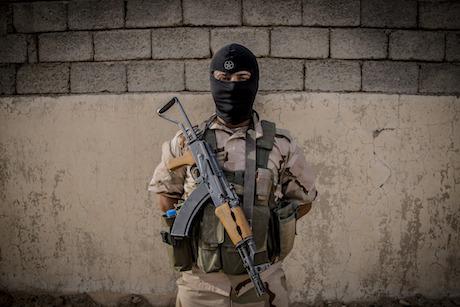The Kurdistan Regional Government of Iraq (KRG) has been embroiled in a heated dispute over the election – or re-election – of its president. The term of the incumbent Massoud Barzani, who has served as president of the KRG since 2005, expired on 19 August 2015. Since then, the question of what should happen in the aftermath of this expiry has been a topic of great controversy, often confrontational and violent.
The Suleymaniyah branch of Barzani’s Kurdistan Democratic Party (KDP) was attacked in early October by pro-opposition Patriotic Union of Kurdistan (PUK) and Change Movement (Gorran) protesters. That led the KDP to take measures against, in particular, Gorran, including preventing Parliament Speaker Mohamad Yousif (from Gorran) from entering the KRG capital, Erbil, and removing all Gorran ministers from their posts.
Not only has the Kurdish political scene been polarised over this question, but some regional actors have also become closely involved in the matter. As of now, Barzani continues to occupy the presidential seat, while controversy rages regarding possible domestic and regional ramifications.
Genesis of disagreements
In the absence of clear constitutional guidelines, there are two contending narratives as to how to proceed. Firstly, the opposition, which asserts that once Barzani’s term expired the speaker of parliament should have assumed his authority until the election of the next president by parliament. The emphasis on the role of parliament is important because it is a contentious issue, related to the mode of the KRG’s governance vis-a-vis a presidential versus parliamentary system.
In contrast, the pro-Barzani camp, led by the KDP, contends that Barzani should continue in office until a new president is elected by the people. The emphasis on the people is important as well. The pro-Barzani camp argues that it is the people who should elect the president whie the anti-Barzani group contends that parliament should have that power. The former group supports a presidential system whereas the latter favours a parliamentary system, hence also a reduction of the president’s power.
The controversy over the presidency has side-lined the optimism felt earlier for KRG’s independence, which Barzani has repeatedly emphasised and has called for a referendum on the topic.
Beside these domestic considerations, the dispute has a regional dimension, playing out as an open rivalry between Turkey and Iran over which should be the primary regional actor influencing the KRG in particular and regional Kurdish politics at large.
Regional implications
Since the invasion of Iraq in 2003, Turkey feels that it has largely lost Iraq to Iran. Despite its early uneasiness, it has arrived at the conclusion that it needs to form an alternative coalition.
In this endeavour, Turkey attempted to establish the architecture of its influence in Iraq primarily on two forces: Sunnis and the Barzani-led Iraqi Kurds, which to some extent curtail Iranian influence, starting from 2007-8. Its previous investment in Turkmens, who constitute a small but significant minority in Iraq, did not pay off. Beside them being small in number and limited in size, the majority of them are Shia and politically they have allied themselves with the main Shia parties. As a result, they fell within the Iranian sphere of influence.
Moreover, to the dismay of Turkey, the marginalisation of the Sunnis in national Iraqi politics has been aggravated by the passage of time. With it, the sphere of Turkey’s influence has contracted. Now it is primarily the Barzani-led area that constitutes Turkey’s primary sphere of influence in Iraq. In other words, Turkey sees a Barzani-led KRG as a counterweight to the Shia-dominated central government and as a means of curtailing Iran’s influence in the country’s north.
Second, on the level of intra-Kurdish politics, both the Kurdistan Workers’ Party (PKK) and the KDP have been vying for supremacy and dominance over regional Kurdish politics. They faced each other in Syria, where the PKK proved victorious over the KDP, and they both have sister organisations in Iran.
The PKK, working closely with KDP’s arch-enemy, the PUK, and the newly dynamic Gorran movement, tries to limit the influence of the KDP even within the KRG. The starkly different accounts offered by the KDP and the PKK during the recent liberation of Sinjar from Daesh (the Islamic State group) clearly illustrates this intense rivalry. The KDP was quick to emphasise that the liberation of the town was solely the work of the Iraqi Kurdish Peshmerga, whereas the PKK side also claimed a major role in this victory, which the KDP wasn’t willing to concede.
Given that the PKK has also been engaged in an over three-decades-long armed struggle with Turkey, the prospect of its victory over the KDP rings alarm bell in Ankara.
Turkey has, therefore, been actively enmeshed in this imbroglio, having appreciated the level of danger that a departure of Barzani might pose for Turkey.
Turkey’s then foreign ministry undersecretary and present foreign minister, Feridun Sinirlioglu, travelled in July to the KRG, both to Erbil and Suleymaniyah, to convey Turkey’s view and to lobby on behalf of Barzani during the height of the crisis over the future of the KRG’s presidency.
Likewise, Turkey invited the representatives of the anti-Barzani camp to Ankara to warn them about the possible repercussions Barzani’s departure would have on Turkish-KRG relations. After the 1 November general election in Turkey, Sinirlioglu again paid a visit tp the KRG, meeting President Barzani and other high-ranking officials.
Prospect
The local and regional developments since the outbreak of the crisis over the KRG presidency shows that Barzani will remain in power for a variety of reasons. First and foremost, the aggressive push to remove Barzani from presidential office risks a bloody intra-Kurdish civil war in the KRG, reminiscent of the internecine struggles of the 1990s. It is unlikely that any party will take such a path.
Second, Turkey and the United States have clearly and openly supported the extension of Barzani’s term; the Kurdish opposition can ill afford not to pay heed to this demand.
Third, the fight against Daesh benefits Barzani’s efforts to stay in power. The general conviction amongst the important international decision-makers with a stake in Kurdish and Iraqi politics is that at a time when the need for forming an international coalition against Daesh is acute, with the need for local participation in this fight, the KRG can’t afford to waste its time and energy on domestic politic quarrels.
Nevertheless, these factors don’t mean that Barzani will experience a smooth presidential term. Kurdish opposition, possibly with moral and political support from Iran, will keep pressure on Barzani and attempt to hinder and reduce the level of his power and influence within the KRG and regional Kurdish politics.
In another words, the anti-Barzani Kurdish opposition can usher in a soft “Lebanon-isation” of KRG politics, meaning that the KRG will be embroiled in protracted debates over the presidency with all attendant detrimental effects on the issue of governance in the KRG.
As a result, the prospect of a de facto emergence of zones of influence and quasi-sovereignty among the different Kurdish political groups is real, endangering the political-economic gains and international prestige that resulted from forming a unity government in the aftermath of the US invasion of Iraq.
(*) Galip Dalay works as a research director at al-Sharq Forum and senior associate fellow on Turkey and Kurdish Affairs at the Al Jazeera Centre for Studies.
The views expressed in this article belong to the author and do not necessarily reflect the editorial policy of Middle East Eye.
Source: Middle East Eye
http://www.middleeasteye.net/columns/regional-implications-iraqi-krgs-presidency-row-1521167001#sthash.i3Jlmmuo.dpuf








Comment here